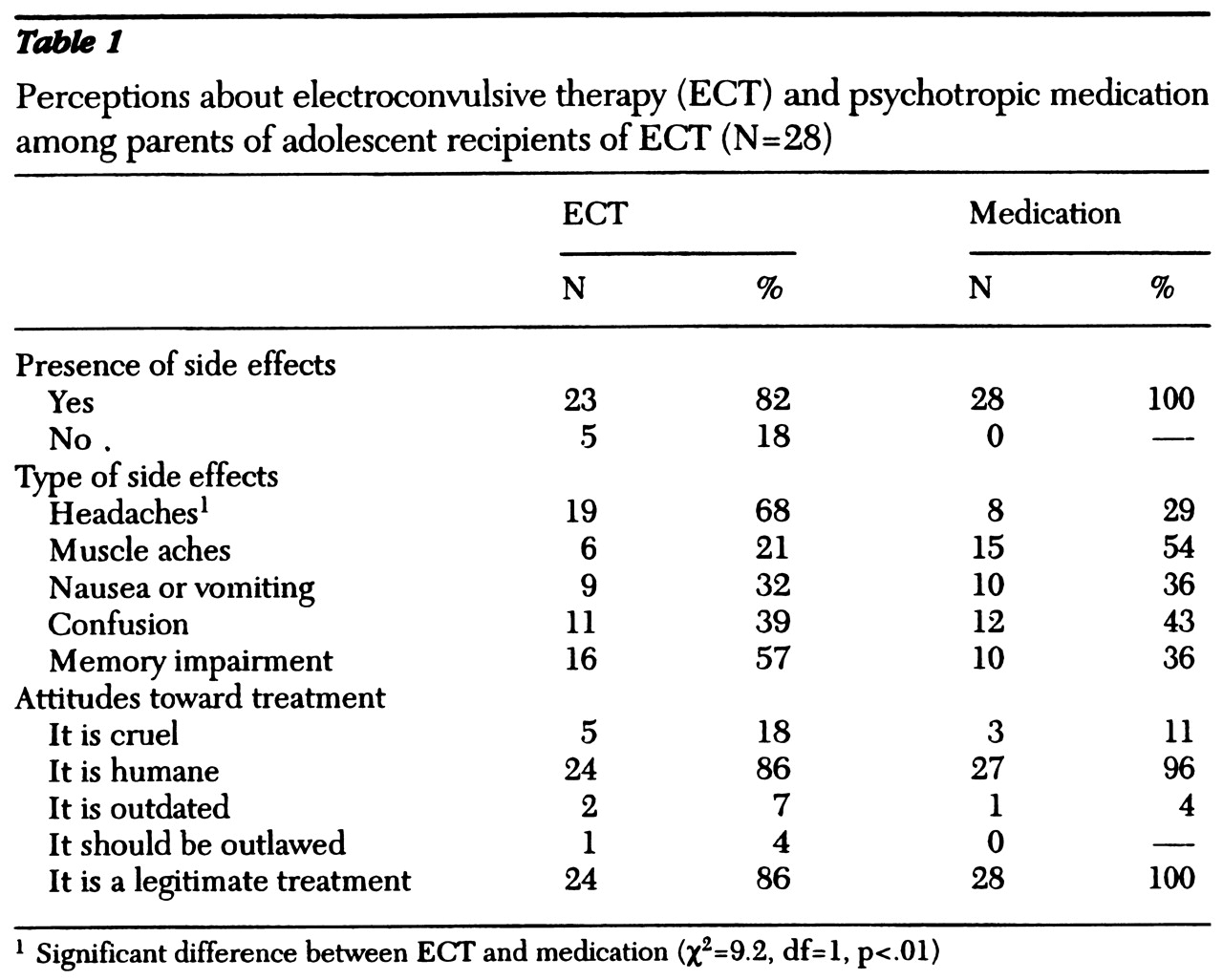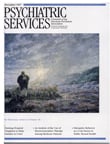Electroconvulsive therapy (ECT) for adolescents is an uncommon and controversial treatment that appears similar in its effectiveness and side effects to ECT for adults (
1). Parents of teenage patients are usually included in the process of making the decision to use ECT (
2), and, after administration of ECT, parents are sometimes consulted by other parents whose children are being assessed for that treatment (
3). However, no data on parents' views about ECT have been published. The need to learn about parents' attitudes toward ECT for adolescents is heightened by attempts to prohibit ECT for patients in this age group (
1,
4).
The aim of the study reported here was to determine parents' experience with, knowledge about, and attitudes toward ECT for their adolescent children. This information may assist policy makers as well as key stakeholders, including patients, parents, and clinicians, in situations where ECT is being considered as a treatment option.
Methods
A 56-item survey was constructed by the authors to assess the views about ECT of parents of persons who received this treatment before age 19. People under age 19 who received ECT in the Australian state of New South Wales between September 3, 1990, and January 31, 1998, were identified through inspection of hospital ECT registers. They were asked to give written informed consent for the researchers to interview a parent who had been involved in the young person's care at the time ECT was given. The research team also sought consent from the mental health professional currently involved in the patient's care. The survey was administered by telephone by the second author, a senior trainee in child psychiatry.
Results
The study was approved by 18 of the 20 hospitals in which ECT had been given to a person under age 19. Forty-five patients who met the study criteria were identified, providing a pool of 45 parents who could potentially be contacted. Twenty-eight of these parents were interviewed, on average three years after the child's first ECT treatment. Of the 17 parents who did not participate in the study, seven could not be traced, four did not participate because their child refused permission, three were not contacted because the mental health professional involved in their child's treatment did not consent, and three declined to be interviewed.
The majority of parents—21 of 28 respondents—felt they had received adequate information from health professionals before their child received ECT. One parent said she would have also liked to talk to a parent who had been in a similar situation.
Almost two-thirds of the parents, or 17 respondents, believed that ECT had been beneficial. About a third, or nine respondents, thought ECT had made no difference to the patient's clinical state. One parent believed the treatment had made the child worse.
Table 1 shows data on parents' opinions about the side effects associated with their child's ECT and with psychotropic medication. No statistically significant differences were found between ECT and medication in the perceived frequency of specific side effects, except that parents were more likely to report children's headaches with ECT than with medication (χ
2=9.2, df=1, p<.01).
Most parents—18 of 28 respondents—had informed only relatives and close friends about their child's ECT treatment. About a third, or ten respondents, had also told others. Half the parents, or 14 respondents, had attempted to conceal the history of ECT treatment.
All parents knew that ECT is a treatment entailing an electrically induced seizure. Parents' level of knowledge about the usual indications for ECT was generally adequate. A majority—23 of 28 respondents—stated that depression was a common indication for the treatment. Few parents—only seven respondents—believed that schizophrenia was a usual indication. Only two respondents believed that ECT was used to control behavior, and none believed that ECT was employed as a punishment. Less than a fifth of the parents—five respondents—considered ECT an unsafe treatment, and five believed ECT could lead to permanent damage.
Nineteen parents cited the media as a source of information about ECT. When asked to give examples, ten parents mentioned the film One Flew Over the Cuckoo's Nest.
Data on parents' attitudes toward ECT and psychotropic medication are presented in
Table 1. If ECT was recommended by a doctor, the vast majority of parents reported that they would support a decision for their child to have the treatment again (N=24 respondents), that they would recommend ECT to family or friends (N=23), and that they would agree to ECT for themselves (N=22). Three-quarters of the parents, or 21 respondents, believed that ECT should be given to young people if needed, three parents said it should not be given, and four parents were undecided. Three parents queried why their children had not received ECT earlier.
Attitudes toward the illness, ECT, and medications were compared by asking parents to nominate which was the worst. The vast majority of parents—22 of 28 respondents—felt that the illness was the most aversive experience. Three parents believed medication to be the worst; only one parent nominated ECT as the worst.
Discussion and conclusions
The American Psychiatric Association (
5) and the Royal College of Psychiatrists (
6) emphasize the importance of involving family members of patients in pretreatment preparation for ECT. However, little information about parents' or other family members' opinions about ECT has been available. As far as we are aware, the study reported here is only the second report, coming after a study by Szuba and associates (
7), to examine the attitudes of relatives of patients treated with ECT and the only survey to have explored the views of parents of adolescent recipients.
This study has several limitations, including the retrospective design, lack of reliability data about the survey instrument, small sample size, and absence of a control group. Nevertheless, the results suggest that, overall, parents of adolescent recipients of ECT have fairly positive attitudes toward ECT and find it an acceptable treatment.
The findings are consistent with those of the study by Szuba and associates (
7) in which 25 relatives of adult recipients of ECT were interviewed. In our investigations, the views of parents about ECT were comparable to those of their children (
8). For example, similar proportions of parent and patient groups believed that ECT had been helpful and that it was a humane treatment; similar proportions of the two groups reported that they would recommend ECT to others and that they wanted to conceal the fact of their treatment.
The assumption that ECT is abhorrent to family members (
4) was not borne out by the results of this survey. This information may reassure prospective adolescent recipients of ECT, as well as their family members and clinicians, and also bears consideration by policy makers.


